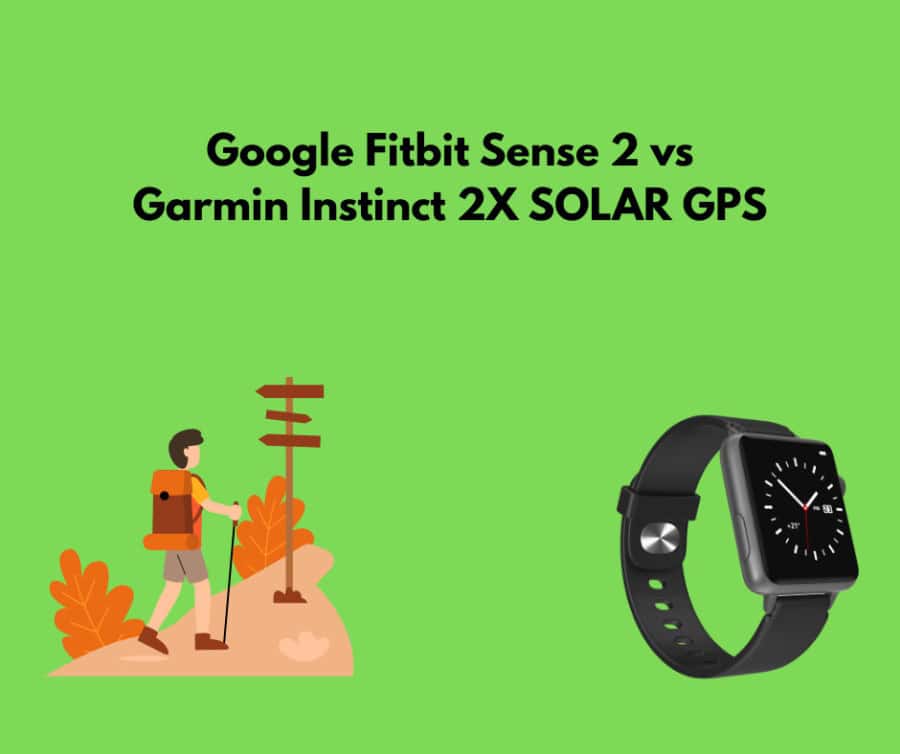Table of Contents
Some links on posts are affiliate links and will earn us a commission from qualifying purchases
With Amazon holding it’s Black Friday Sale, I thought I’d take a look to see what was on offer for those looking for a new smartwatch to help with their fitness tracking. Here are two options that are on offer today!
Smartwatches and fitness trackers have become essential tools for people who want to monitor their health and stay active. These devices offer features like heart rate tracking, sleep monitoring, GPS, and workout data. They help users understand their fitness levels and motivate them to reach their goals.
Among the many options, some smartwatches focus on health and wellness, while others are designed for outdoor activities and durability. The Google Fitbit Sense 2 is a smartwatch with a strong emphasis on health features and smart capabilities. In contrast, the Garmin Instinct 2X Solar GPS is built for rugged use, with solar charging and robust GPS tracking for outdoor enthusiasts.
When choosing between these products, it is important to consider factors such as battery life, durability, health monitoring accuracy, and GPS performance. Your lifestyle and priorities will affect which device suits you best. We researched and tested both the Google Fitbit Sense 2 and Garmin Instinct 2X Solar GPS to help you decide which one matches your needs.
Best Fitness Smartwatches
We have compared the Google Fitbit Sense 2 and the Garmin Instinct 2X SOLAR GPS to help you find the best fitness smartwatch. Our list covers the key features, performance, and value of each watch to guide your choice.
Garmin Instinct 2X Solar

We think the Garmin Instinct 2X Solar is a solid choice for anyone wanting a tough, reliable watch with amazing battery life and useful outdoor tools.
This watch really stands out for its battery life. We found that leaving it in sunlight regularly kept it charged almost indefinitely in smartwatch mode. That’s a huge bonus if you spend lots of time outdoors or forget to charge often.
The rugged build gave us confidence in harsh environments. It passed through rain and knocks without any issues. The solar charging lens also produces more energy than the smaller models, so you get extra time between charges.
While the screen uses monochrome technology that saves battery, it isn’t as crisp as colour displays. It suited us for outdoor use though, as it stays readable in bright light. The built-in LED flashlight was surprisingly useful during night runs or low-light situations.
Overall, this model feels like a dependable partner for outdoor adventures and training. You get a watch that can take a beating while offering plenty of smart features to track your health and navigation. For those wanting something tough with great battery life, this fits the bill well.
Fitbit Sense 2

We recommend the Fitbit Sense 2 for those who want a smart and simple fitness watch with strong health tracking and great battery life.
Pros
- Lasts over 6 days on a single charge
- Offers detailed health insights like stress and sleep tracking
- Lightweight, comfortable, and easy to wear all day
Cons
- Occasional screen lag
- Some features only fully work with premium subscription
- Straps may need upgrading for comfort
When we use the Fitbit Sense 2, it feels light on the wrist and comfortable enough to wear all day, even while sleeping. The battery life is impressive; a single charge can hold up well beyond five days with normal use. This makes it great for not having to think about constant charging.
The health features stand out. The stress monitoring through skin response and the sleep tracking with personalised reports help us understand our body better. We also liked tracking heart rate and activity automatically, which worked smoothly for us.
Connecting to our phone was simple, with clear call and message alerts directly on the watch face. However, the touchscreen sometimes lagged, which could be frustrating when trying to navigate quickly. Overall, it’s a solid smartwatch for health and fitness without complicating things.
Buying Guide
When we choose a smartwatch, we need to think about what matters most to us. Some of us want health tracking, others care about battery life or how rugged the watch is. Understanding our needs helps us pick the right device.
We should look closely at health and fitness features. This includes heart rate monitoring, sleep tracking, and stress levels. For those who exercise outdoors, built-in GPS and waterproof ratings are key. If we swim or hike, water resistance and durability become important.
Battery life is also crucial. Some watches last only a day or two, while others can go for weeks without charging. If we don’t want to charge often, longer battery life is better.
Another factor is the screen and controls. Touchscreens are easy to use but may drain battery faster. Buttons can work well in tough conditions or when wet.
We can also check if the watch supports apps or smartphone notifications. This is useful if we want to stay connected while on the move.
| Feature | What to Consider |
|---|---|
| Health Tracking | Heart rate, sleep, stress, activity data |
| Battery Life | Daily charging vs. multi-day use |
| Durability | Water resistance, build quality |
| GPS | Accuracy, outdoor tracking |
| Interface | Touchscreen vs. buttons |
| Smart Features | Notifications, apps, music control |
By listing our priorities, we can narrow down the options and pick a watch that fits our lifestyle.
Frequently Asked Questions
We have compared the key differences in features, battery life, health tracking, user experience, durability, and price. These points help us understand which device suits different needs.
What distinguishing features does the Garmin Instinct 2X Solar GPS have compared to the Fitbit Sense 2?
The Garmin Instinct 2X Solar GPS offers solar charging, which extends battery life outdoors. It also has more rugged, military-grade durability.
Fitbit Sense 2 focuses more on advanced health sensors, including ECG and skin temperature tracking, which Garmin lacks.
How does battery life compare between the Fitbit Sense 2 and the Garmin Instinct 2X Solar GPS?
Garmin’s Instinct 2X Solar can last up to 28 days with solar charging, depending on exposure to sunlight.
Fitbit Sense 2 typically lasts around 6 days on a single charge.
Can the Garmin Instinct 2X Solar GPS match the health monitoring capabilities of the Fitbit Sense 2?
No, Fitbit Sense 2 has more detailed health tracking tools. It measures ECG, skin temperature, and more detailed sleep stages.
Garmin focuses more on outdoor and activity tracking rather than deep health insights.
Which device offers a better user experience for fitness tracking: the Fitbit Sense 2 or the Garmin Instinct 2X Solar GPS?
Fitbit Sense 2 provides a clean touchscreen interface, making it easy for casual users.
Garmin Instinct 2X Solar uses physical buttons, which work better in rough conditions but may be less intuitive for some.
In terms of durability, how do the Fitbit Sense 2 and the Garmin Instinct 2X Solar GPS differ?
Garmin Instinct 2X Solar is built to military standards. It is shockproof, water-rated to 100m, and designed for tough outdoor use.
Fitbit Sense 2 is water-resistant to 50m but is not as rugged overall.
Are there any significant price differences between the Garmin Instinct 2X Solar GPS and the Fitbit Sense 2?
Garmin Instinct 2X Solar tends to be more expensive due to its rugged design and solar features.
Fitbit Sense 2 is usually cheaper and targets users who want more health tracking at a lower price.
Conclusion
When comparing the Google Fitbit Sense 2 and Garmin Instinct 2X SOLAR GPS, we see two strong options that serve different needs. The Fitbit Sense 2 focuses more on health monitoring and smart features. It offers detailed heart rate tracking, stress management, and a range of apps for everyday use.
On the other hand, the Garmin Instinct 2X SOLAR is built for rugged outdoor use. It has excellent GPS accuracy, long battery life boosted by solar charging, and robust durability. This makes it ideal for those who spend a lot of time outdoors or need reliable navigation.
Here’s a quick comparison to help us decide:
| Feature | Fitbit Sense 2 | Garmin Instinct 2X SOLAR |
|---|---|---|
| Health Tracking | Advanced (stress, ECG) | Basic but solid |
| Battery Life | Up to 6 days | Up to 24 days + solar boost |
| GPS Accuracy | Good for daily use | Excellent, designed for tough conditions |
| Smart Features | Wide app support | Limited smart features |
| Durability | Water-resistant, everyday | Military-grade, very rugged |
Our choice depends on what matters most. For health insights and smart tech, Fitbit Sense 2 fits well. For outdoor adventures and longer battery life, Garmin Instinct 2X SOLAR is better suited.
Recent Posts
The Science of Efficient Walking: Optimising Movement for Health and Speed
Walking is a natural activity most people do every day, but how efficiently you walk can make a big difference to your energy use and overall health. Efficient walking means using the least amount of...
If you're reading this blog post, chances are you've been on a hike before. It's great for your body and mind! But sometimes it can be hard to find the motivation to get outside again. Here I have...


